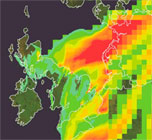
On 20 June 2012, the Review of Transboundary Air Pollution (RoTAP) was published – a document which examines changing patterns in acidification, eutrophication, ground level ozone and heavy metals in the UK. Compilation of the RoTAP review, led by the NERC Centre for Ecology & Hydrology, chaired by Professor David Fowler FRS and funded by Defra, NERC and the Devolved Administrations, involved 60 scientists and reviewers.
This latest report found that the chemical climate of the UK has changed dramatically over the last 30 years as a consequence of UK and European policies to solve air pollution problems.
Sulphur emissions and concentrations have greatly declined, rain is no longer acid, and soils and freshwaters are slowly recovering.
However not all messages from the review were positive. The study found that although peak ozone concentrations have declined by about 30% as a result of controls on precursor emissions in the UK and continental Europe, background ozone concentrations have grown by about 15% due to increases in precursor emissions elsewhere in the northern hemisphere. These changes mean that ground level ozone remains a threat to crops and natural vegetation.
The review also found that deposition of nitrogen in the UK changed little over the last 20 years, despite large reductions in emissions of nitric oxide and nitrogen dioxide (NOx). Instead, the main benefit of reduced NOx emissions been to reduce NOX exported from the UK. Widespread effects of nitrogen deposition include a loss of UK biodiversity. For example, there is strong evidence that nitrogen deposition has reduced species richness in a range of habitats of high conservation value over large areas of the UK.
Key messages from the review include:
- Emission controls have reduced sulphur dioxide emissions by over 90% from their peak value in the 1950s and reduced nitrogen oxides by 58% since 1970, with a corresponding 50% reduction in air concentrations of nitrogen oxides
- Peak ground level ozone concentrations declined by almost 30% since the 1980s. However, emissions throughout the northern hemisphere have led to background ozone levels increasing by about 15% between 1987 and 2010
- The amount of metals deposited in the UK from the atmosphere greatly exceeds the amount of metals reported to be emitted from anthropogenic sources by up to a factor of 10, thus it is unclear where all this metal originates.
- Over the last twenty years, large decreases in rainfall acidity (85%) and sulphate (75%) have occurred and biological recovery of freshwater ecosystems is slowly progressing
- Nitrogen deposition has widely decreased plant species richness in a range of habitats of high conservation value in the UK and this shows no signs of improvement
- Ozone reduced UK wheat production by 1.2 million tonnes in 2000, representing 7% of production
Item date 26/06/2012
Follow Us
Our newsletter
 Privacy Notice Summary:
Privacy Notice Summary:
- Who this is for: You must be at least 13 years old to use this service.
- What we collect: We store your email address
- Who we share it with: We use "Campaign Monitor" to store it, and do not share it with anyone else.
- More Info: You can see our full privacy notice here
AirMail newsletter
The latest news and research from ERG: View the archive

